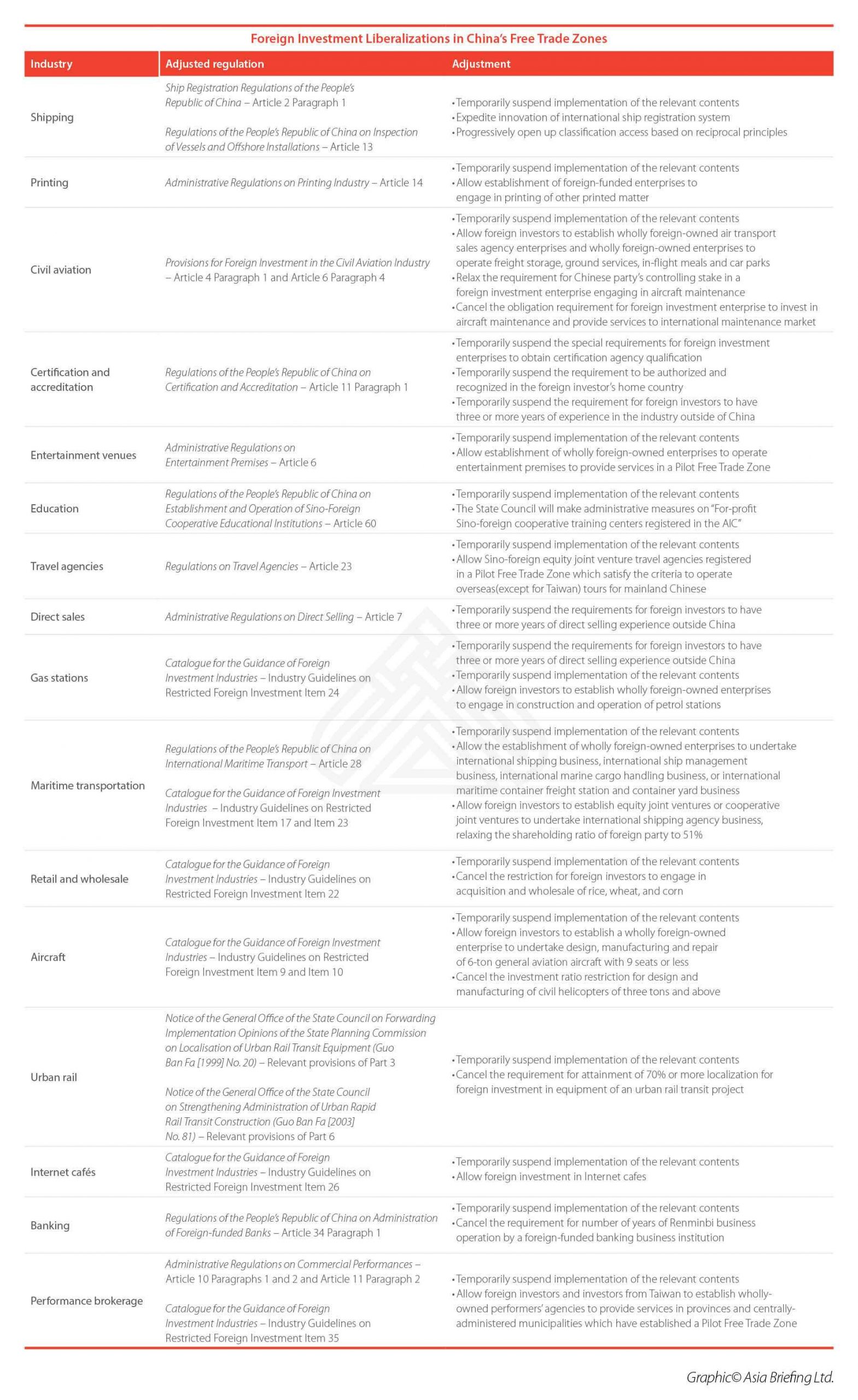China Eases FDI Restrictions in Free Trade Zones
China has relaxed restrictions on foreign investment in the country’s 11 free trade zones (FTZs), per a decision released by the State Council, China’s cabinet, on January 9.
The Decision on Temporarily Adjusting Relevant Administrative Regulations, State Council Documents and Departmental Rules Approved by the State Council within FTZs (the Decision) updates various administrative regulations to extend to China’s new FTZs, and relaxes investment restrictions in 16 industries.
Several of the relaxed rules introduced by the Decision are technically only temporary. The Decision directs the departments in charge of the relevant industries to issue or amend regulations to formalize the changes.
The industries affected by the Decision are shipping, printing, civil aviation, certification and accreditation, entertainment venues, education, travel agencies, direct sales, gas stations, maritime transportation, retail and wholesale, aircraft, urban rail, internet cafés, banking, and performance brokerage.
![]() RELATED: China’s Inbound and Outbound FDI Goals
RELATED: China’s Inbound and Outbound FDI Goals
The complete changes introduced by the Decision are as follows:

Note: Item (1) to Item (9) were previously temporarily adjusted for the Shanghai, Guangdong, Tianjin, and Fujian FTZs, and the new temporary adjustments shall apply to the other FTZs. Item (10) to Item (16) shall apply to all FTZs.
![]() Pre-Investment, Market Entry Strategy Advisory Services from Dezan Shira & Associates
Pre-Investment, Market Entry Strategy Advisory Services from Dezan Shira & Associates
The relaxed rules are welcome for investors in the affected industries looking to test the Chinese market or expand their operations in China’s growing number of FTZs. Last year, China officially opened seven new FTZs, bringing its total to 11, and reduced investment restrictions with a new FTZ Negative List.
However, the Decision appears to merely formalize many of the changes introduced in last year’s FTZ Negative List, as well as the Catalogue for the Guidance of Foreign Investment Industries, by updating accompanying regulations accordingly. For example, the FTZ Negative List already liberalized foreign investment in Internet cafés and aviation, among other industries. The Decision therefore largely updates rules that were made outdated by recent regulatory changes.
Although the Decision does not offer many notable new liberalizations, it gives foreign investors more regulatory clarity about the implementation of the FTZ Negative List, and shows that the FTZs and industry regulators are moving forward with the changes. As the Decision directs relevant industry regulators to formulate accompanying administrative measures, investors can expect new industry-specific rules for foreign investment in China’s FTZs to be issued shortly.
About Us
China Briefing is published by Asia Briefing, a subsidiary of Dezan Shira & Associates. We produce material for foreign investors throughout Asia, including ASEAN, India, Indonesia, Russia, the Silk Road, and Vietnam. For editorial matters please contact us here, and for a complimentary subscription to our products, please click here.
Dezan Shira & Associates is a full service practice in China, providing business intelligence, due diligence, legal, tax, accounting, IT, HR, payroll, and advisory services throughout the China and Asian region. For assistance with China business issues or investments into China, please contact us at china@dezshira.com or visit us at www.dezshira.com
- Previous Article How to Calculate Corporate Income Tax in China
- Next Article The Senior Care Sector in China: Is it Time to Think Differently?






